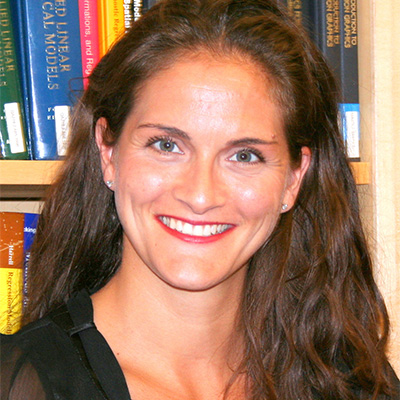New Faculty, Fall 2015
The School of Public Health is fortunate to have several new faculty members in the fold whose research interests run the gamut from behavioral interventions to reduce risk among racial, sexual and gender minorities, to weight-related disorders, to longitudinal mediation analysis, to HIV prevention and pharmacoeconomics. Take a moment to learn how they are working to improve population health.

Elizabeth Aston
Assistant Professor of Behavioral and Social Sciences (Research)
Elizabeth Aston received her Ph.D. in neuroscience in 2012 from Wake Forest School of Medicine. Her doctoral research investigated estimation of breath alcohol concentration and simulated driving behavior among heavy episodic drinkers. In 2013 she became a Teaching Program Fellow at Brown’s Center for Alcohol and Addiction Studies (CAAS), where she examined predictors of cannabis use disorder severity among regular marijuana users and the relative reinforcing value of marijuana using a behavioral economic marijuana purchase task. She has joined the faculty at Brown to continue this research in laboratory marijuana administration methodology, behavioral economic theory, and advanced data analysis.

Katie Brooks Biello
Assistant Professor of Behavioral and Social Sciences (Research)
Katie Brooks Biello comes to Brown from the Harvard T.H. Chan School of Public Health, where she was a research scientist in the department of epidemiology. She was also an adjunct assistant professor in the department of epidemiology at the Boston University School of Public Health, and an affiliated investigator at the Center for Interdisciplinary Research on AIDS at the Yale School of Public Health, where she also received her PhD in epidemiology and public health. Her research interests are in identifying and understanding the underlying risk factors for social inequities in HIV/STIs and developing behavioral interventions to reduce risk among racial, sexual and gender minorities and those in resource limited settings, both domestically and globally.

Ani Eloyan
Assistant Professor of Biostatistics
Ani Eloyan’s research interests include statistical analysis of brain images, multivariate analysis of high dimensional data, and Bayesian analysis of large data. She received her PhD in statistics at North Carolina State University. Her dissertation focused on semi-parametric likelihood based methods for independent component analysis and constrained density estimation via a modified EM algorithm. Prior to joining Brown, Eloyan was an assistant professor in the department of biostatistics at the Johns Hopkins Bloomberg School of Public Health.

Alison Field
Professor of Epidemiology, Chair of the Department of Epidemiology
Alison Field’s research focuses on determining the optimal classification for eating and weight-related disorders and identifying the modifiable causes, correlates, consequences, and course of overweight and eating disorders among children, adolescents, and adult women. Her early research on eating disorders focused on identifying the personal, peer, family, and media influences on starting to binge eat, purge, or develop an eating disorder. She is currently investigating how eating disorders should be best classified, and is pursuing obesity classification research using a variety of samples of children, adolescents, and adults. Field earned her ScD in epidemiology at the Harvard T.H. Chan School of Public Health, where she was also a professor of both epidemiology and pediatrics before coming to Brown.

Matthew Mimiaga
Professor of Behavioral and Social Sciences, Professor of Epidemiology, Director of the Center for Health Equity Research
Matthew Mimiaga was most recently an associate professor of psychiatry at the Harvard Medical School and an associate professor of epidemiology at the Harvard T.H. Chan School of Public Health, where he also received his ScD. His research interests are in behavioral medicine, infectious disease and psychiatric epidemiology, and global health. He conducts longitudinal epidemiological investigations, and mixed-methods (qualitative/quantitative) research, and develops and tests both behavioral and biomedical intervention trials. His intervention trials focus on HIV primary and secondary prevention; substance abuse prevention and treatment development studies for crystal methamphetamine and other stimulant dependence in the context of concurrent HIV; and global public health research that takes place in settings for which little work has been done with respect to HIV prevention, treatment for substance dependence, and intertwined psychosocial conditions that exacerbate HIV risk behaviors and infection.

Theresa Shireman
Professor of Health Services, Policy & Practice
Theresa Shireman specializes in pharmacoepidemiology, pharmacoeconomics, and health services research. She earned her PhD in pharmacy economics and in epidemiology and public policy at the University of Wisconsin-Madison. Shireman utilizes three overlapping sets of research skills: analysis of large, observational databases; pharmacoepidemiology; and cost-effectiveness analysis. She has many years of experience with programming and analyzing administrative claims data, particularly CMS data such as Medicare and Medicaid claims, and applies health economic evaluations to health care interventions.

Adam Sullivan
Assistant Professor of Biostatistics (Teaching Scholar)
Adam Sullivan earned his PhD in biostatistics from the Harvard T.H. Chan School of Public Health, where he worked on structural equation models, sensitivity analysis and longitudinal mediation analysis. He also co-created the first flipped/blended course at Harvard, and worked as a fellow in Harvard’s Initiative on Health, Religion and Spirituality, where he researched connections between spirituality and end of life cancer care. Sullivan’s future research will focus on longitudinal mediation, statistics education and palliative care.

Tyler Wray
Assistant Professor of Behavioral and Social Sciences (Research)
Tyler Wray earned his PhD from the University of South Dakota in 2013 and completed a postdoctoral fellowship at Brown University in the Center for Alcohol and Addiction Studies. Wray’s work involves using technology to help stop HIV. He is often involved in projects that lie at the intersection between behavioral and computer science. This sets the stage for exploring how technology can be used to help identify at-risk individuals (both for transmission, and for those living with HIV, those at risk for falling out of care), to help reduce unhealthy or risky behaviors (like alcohol, drug use, unprotected sex) and to help increase preventive behaviors (like HIV testing, using condoms, using PrEP).

Tongzhang Zheng
Professor of Epidemiology
Dr. Zheng comes to Brown from the Yale University School of Public Health, where he was the Susan Dwight Bliss professor of epidemiology and the chair of the department of environmental health sciences for the past 12 years. Dr. Zheng earned an ScD in epidemiology from Harvard University and a medical degree from the Tongji Medical School, Huazhong University of Science and Technology. Dr. Zheng has been conducting epidemiological research to investigate the relationship between environmental exposures, genetic polymorphisms, epigenetic factors and gene-environment interactions in the risk of various cancers in the US and in China. Dr. Zheng has authored or co-authored over 380 articles and book chapters and co-edited the textbook, Epidemiology and Biostatistics. He has been leading two Fogarty training programs in China and he is currently building three large cohort studies in China. He is currently the Chief Scientific Advisor for China National Institute of Environmental Health Sciences, and he has served as a senior advisor and member on several committees for the National Academy of Sciences and the International Agency for Research on Cancer (WHO).